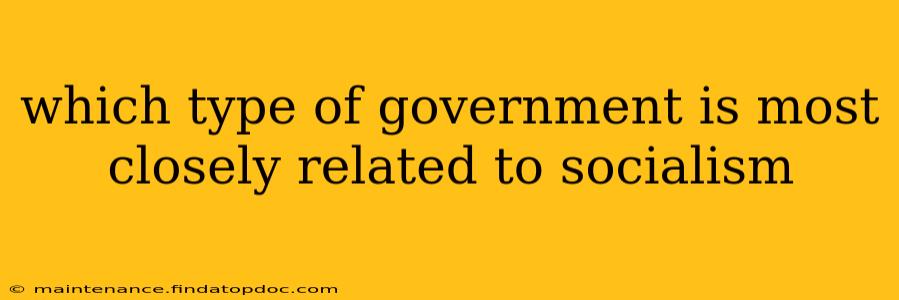Which Type of Government is Most Closely Related to Socialism?
The relationship between socialism and government is complex, and there's no single type of government inherently linked to it. Socialism is an economic system, not a political one. While certain governmental structures are more commonly associated with socialist policies, it's crucial to understand the nuances and avoid oversimplification. Let's explore the connection and address some common questions.
Understanding Socialism:
Socialism is an economic system advocating for social ownership and cooperative management of the means of production and distribution of goods and services. This can take various forms, ranging from democratic socialism to more authoritarian models. The core principle is prioritizing social welfare and reducing economic inequality through collective control, rather than individual profit maximization.
Governmental Structures Often Associated with Socialist Policies:
Several governmental structures frequently implement socialist policies, but it's vital to remember that the presence of socialist policies doesn't automatically define a government as "socialist":
-
Social Democracies: These are arguably the most common governmental systems incorporating significant socialist policies. They generally maintain a market economy but implement robust social safety nets, extensive public services (healthcare, education, etc.), and strong regulations to mitigate income inequality. These countries are typically parliamentary democracies, valuing individual rights and freedoms. Examples include Scandinavian countries like Sweden, Denmark, and Norway.
-
Democratic Socialism: This ideology seeks to achieve socialist goals through democratic means, typically within a framework of a representative democracy. It aims to gradually transition towards socialism through democratic reforms and legislation, rather than revolution. While it advocates for social ownership and control in certain sectors, it doesn't necessarily advocate for abolishing private ownership entirely.
-
Communism (Historically): Historically, communist states have often claimed to be socialist, but their governmental structures were typically authoritarian and totalitarian, with a single party controlling all aspects of life. These systems, exemplified by the former Soviet Union and Maoist China, differed significantly from the democratic socialist models mentioned above. The economic reality in these states often deviated from the ideals of true socialism.
Frequently Asked Questions (Based on People Also Ask):
1. Is socialism a form of government?
No, socialism is primarily an economic system focused on the means of production and distribution of goods and services. It describes how a society organizes its economy, not who holds political power. Various forms of government can implement socialist policies.
2. What is the difference between socialism and communism?
While both advocate for social ownership, they differ significantly in their approach. Socialism, especially democratic socialism, aims to achieve its goals through democratic means and often coexists with market economies. Communism, historically, has been associated with revolutionary overthrow of existing systems and the establishment of a stateless, classless society. In practice, communist regimes have often centralized power and control.
3. Can a capitalist country have socialist policies?
Yes, absolutely. Many capitalist countries implement various socialist policies, such as social security, universal healthcare, or publicly funded education. This is a key characteristic of social democracies, which blend market economies with extensive social programs. The degree of socialist policies varies greatly across different countries.
4. What are some examples of socialist countries today?
Defining a country as "socialist" is complex. While no country perfectly embodies pure socialism, several countries have extensive socialist policies. Scandinavian countries (Sweden, Denmark, Norway) are often cited as examples of countries with strong social democratic systems characterized by robust social safety nets and public services. However, these countries still retain market economies with significant private ownership.
5. What are the advantages and disadvantages of socialist governments?
Advantages: Often cited advantages include reduced income inequality, improved social welfare, and enhanced access to essential services like healthcare and education.
Disadvantages: Potential disadvantages include slower economic growth compared to purely market-based economies, potential inefficiencies due to bureaucracy, and concerns about limitations on individual freedoms in some implementations. The specific advantages and disadvantages are heavily dependent on the specific policies implemented and how the socialist system is structured.
In conclusion, while certain governmental systems are more compatible with and frequently implement socialist policies, socialism itself is an economic model, not a form of government. Understanding this distinction is vital to avoid mischaracterizations and appreciate the diverse ways socialist principles can be integrated into various political systems.
